302 scholarly books by University College London and 9
have author last names that start with J
302 scholarly books by University College London and 9
302 scholarly books by University College London
9 have author last names that start with J have author last names that start with J
9 have author last names that start with J have author last names that start with J

The Poetry of John Tyndall
Roland Jackson
University College London, 2020
John Tyndall (c. 1822–1893), is best known as a leading natural philosopher and trenchant public intellectual of the Victorian age, who spoke and wrote controversially on the relationship between science and religion. Far fewer people know that he also wrote poetry.
The Poetry of John Tyndall contains annotated transcriptions of all 76 of Tyndall’s extant poems, the majority of which have not been published before. The poems are complemented by an extended introduction, which explores what the poems can tell us about Tyndall’s self-fashioning, his values and beliefs, and the role of poetry for him and his circle. More broadly, this introduction addresses the relationship between the scientific and poetic imaginations, and wider questions of the purpose of poetry in relation to science and religion in the nineteenth century.
The Poetry of John Tyndall contains annotated transcriptions of all 76 of Tyndall’s extant poems, the majority of which have not been published before. The poems are complemented by an extended introduction, which explores what the poems can tell us about Tyndall’s self-fashioning, his values and beliefs, and the role of poetry for him and his circle. More broadly, this introduction addresses the relationship between the scientific and poetic imaginations, and wider questions of the purpose of poetry in relation to science and religion in the nineteenth century.
[more]
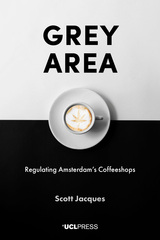
Grey Area
Regulating Amsterdam's Coffeeshops
Scott Jacques
University College London, 2019
Amsterdam’s Coffeeshops, which are local legal dispensaries for marijuana, are often given as examples of Dutch tolerance. In fact, these dispensaries are highly regulated. On the premises, there cannot be minors, hard drugs, or more than 500 grams of marijuana. A coffeeshop cannot advertise, cause a nuisance, or sell more than 5 grams to a person in a day. These rules are enforced by surprise police checks, with violations punishable by closure.
In Grey Area, Scott Jacques examines the policy surrounding coffeeshops with a huge stash of data, which he collected during two years of fieldwork in Amsterdam. How do coffeeshop owners and staff obey the rules? How are the rules broken, and why? The stories and statistics show that order in the midst of smoke is key to Dutch drug policy, vaporizing the idea that prohibition is better than regulation. Grey Area is a timely contribution in light of the recent reforms to cannabis policy worldwide.
In Grey Area, Scott Jacques examines the policy surrounding coffeeshops with a huge stash of data, which he collected during two years of fieldwork in Amsterdam. How do coffeeshop owners and staff obey the rules? How are the rules broken, and why? The stories and statistics show that order in the midst of smoke is key to Dutch drug policy, vaporizing the idea that prohibition is better than regulation. Grey Area is a timely contribution in light of the recent reforms to cannabis policy worldwide.
[more]
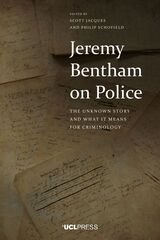
Jeremy Bentham on Police
The Unknown Story and What It Means for Criminology
Scott Jacques
University College London, 2021
Recovering Bentham’s thoughts on policing and what they mean for criminology today.
Jeremy Bentham theorized the panopticon as modern policing emerged across the British Empire, yet while his theoretical writing became canonical in criminology, his perspective on the police remains obscure. Jeremy Bentham on Police recovers the reformer’s writings on policing alongside a series of essays that demonstrate their significance to the past, present, and future of criminology.
Jeremy Bentham theorized the panopticon as modern policing emerged across the British Empire, yet while his theoretical writing became canonical in criminology, his perspective on the police remains obscure. Jeremy Bentham on Police recovers the reformer’s writings on policing alongside a series of essays that demonstrate their significance to the past, present, and future of criminology.
[more]

Chandragupta Maurya
The Creation of a National Hero in India
Sushma Jansari
University College London, 2023
An account of the rise from obscurity to icon of Mauryan emperor Chandragupta Maurya.
The writing and reception of history fundamentally influence how we engage with the past, and nowhere is that more clear than in the rise from obscurity of Chandragupta Maurya (350–295 BCE), the first emperor of the Mauryan Empire. The key moment in the transformation of Chandragupta into a contemporary national icon was a peace-making meeting between Chandragupta and Seleucus, founder of the Seleucid empire and one of Alexander the Great’s generals. But no reliable account exists in early sources, and it is not even clear which ruler was victorious in battle. That uncertainty enabled British and Indian historians of the nineteenth and twentieth centuries to interpret the sources in radically different ways. With Chandragupta representing India and Seleucus standing in for Britain, British scholars argued that Seleucus defeated Chandragupta, while Indian academics contended the opposite. In India, the image of Chandragupta as an idealized hero who vanquished the foreign invader has prevailed and found expression in contemporary popular culture. In plays, films, television series, comic books, and historical novels, Chandragupta is the powerful and virtuous Hindu ruler par excellence. Sushma Jansari shows how that transformation came about and points out the lessons we can learn from it for understanding other historical figures.
The writing and reception of history fundamentally influence how we engage with the past, and nowhere is that more clear than in the rise from obscurity of Chandragupta Maurya (350–295 BCE), the first emperor of the Mauryan Empire. The key moment in the transformation of Chandragupta into a contemporary national icon was a peace-making meeting between Chandragupta and Seleucus, founder of the Seleucid empire and one of Alexander the Great’s generals. But no reliable account exists in early sources, and it is not even clear which ruler was victorious in battle. That uncertainty enabled British and Indian historians of the nineteenth and twentieth centuries to interpret the sources in radically different ways. With Chandragupta representing India and Seleucus standing in for Britain, British scholars argued that Seleucus defeated Chandragupta, while Indian academics contended the opposite. In India, the image of Chandragupta as an idealized hero who vanquished the foreign invader has prevailed and found expression in contemporary popular culture. In plays, films, television series, comic books, and historical novels, Chandragupta is the powerful and virtuous Hindu ruler par excellence. Sushma Jansari shows how that transformation came about and points out the lessons we can learn from it for understanding other historical figures.
[more]
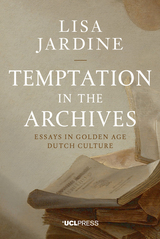
Temptation in the Archives
Essays in Golden Age Dutch Culture
Lisa Jardine
University College London, 2015
Temptation in the Archives is a collection of essays by Lisa Jardine, that takes readers on a journey through the Dutch Golden Age. Through the study of such key figures as Sir Constantjin Huygens, a Dutch polymath and diplomat, we begin to see the Anglo-Dutch cultural connections that formed during this period against the backdrop of unfolding political events in England.Temptation in the Archives paints a picture of a unique relationship between the Netherlands and England in the 17th century forged through a shared experience – and reveals the lessons we can learn from it today.
[more]
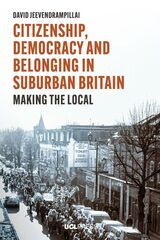
Citizenship, Democracy and Belonging in Suburban Britain
Making the Local
David Jeevendrampillai
University College London, 2021
Examines how suburbanites form community in the face of neoliberal isolation.
An activist group in outer London’s Surbiton suburb, the Seething Villagers commemorate a fictional local history through tongue-in-cheek community festivals. These admittedly “stupid” gatherings celebrate a mythical village of Seething and its many adventures, including a run-in with a mountain-crushing giant. Citizenship, Democracy and Belonging in Suburban Britain explores how the Seething Villagers and other suburbanite fantasies fashion community in the face of neoliberal isolation. By taking the artists’ playfulness seriously, David Jeevendrampillai demonstrates how suburbanites develop fellow-feeling without access to traditional community centers.
An activist group in outer London’s Surbiton suburb, the Seething Villagers commemorate a fictional local history through tongue-in-cheek community festivals. These admittedly “stupid” gatherings celebrate a mythical village of Seething and its many adventures, including a run-in with a mountain-crushing giant. Citizenship, Democracy and Belonging in Suburban Britain explores how the Seething Villagers and other suburbanite fantasies fashion community in the face of neoliberal isolation. By taking the artists’ playfulness seriously, David Jeevendrampillai demonstrates how suburbanites develop fellow-feeling without access to traditional community centers.
[more]
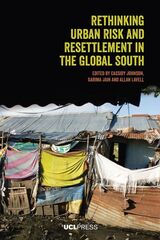
Rethinking Urban Risk and Resettlement in the Global South
Cassidy Johnson
University College London, 2021
A study on urban risk and resettlement programs in the Global South in the era of climate change.
Environmental changes impact everyone, but the burden is especially heavy upon the lives and livelihoods of the urban poor and those living in informal settlements. In an effort to reduce urban residents’ exposure to climate change and natural disasters, resettlement programs are becoming widespread across the Global South. Yet, while resettlement may reduce a region’s future climate-related disaster risk, it can also often increase poverty and vulnerability. This volume collates the findings from a research project that examined urban areas across the globe, including case studies from India, Uganda, Peru, Colombia, Mexico, Cambodia, and the Philippines. The book offers a unique approach to resettlement, providing an opportunity for urban planners to re-think how disaster risk management can better address the accumulation of urban risks in the era of climate change.
Environmental changes impact everyone, but the burden is especially heavy upon the lives and livelihoods of the urban poor and those living in informal settlements. In an effort to reduce urban residents’ exposure to climate change and natural disasters, resettlement programs are becoming widespread across the Global South. Yet, while resettlement may reduce a region’s future climate-related disaster risk, it can also often increase poverty and vulnerability. This volume collates the findings from a research project that examined urban areas across the globe, including case studies from India, Uganda, Peru, Colombia, Mexico, Cambodia, and the Philippines. The book offers a unique approach to resettlement, providing an opportunity for urban planners to re-think how disaster risk management can better address the accumulation of urban risks in the era of climate change.
[more]
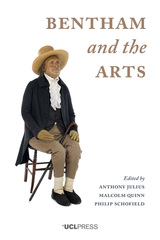
Bentham and the Arts
Anthony Julius
University College London, 2020
Bentham and the Arts considers the skeptical challenge presented by Bentham’s hedonistic utilitarianism to the existence of the aesthetic, as represented in the oft-quoted statement that, ‘Prejudice apart, the game of push-pin is of equal value with the arts and sciences of music and poetry. If the game of push-pin furnish more pleasure, it is more valuable than either.’ Ranging from poetry and sexual nonconformity to the auto-icon and public sculpture, from Hume, Kant, and de Staël to Freud and Michel Onfray, an excellent crew of contributors brings Jeremy Bentham out from the shadow cast by John Stuart Mill with much new to say on taste and politics.
[more]
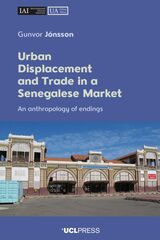
Urban Displacement and Trade in a Senegalese Market
An Anthropology of Endings
Gunvor Jónsson
University College London, 2024
A close look at people’s adaptivity and their capacities to adjust to new circumstances and environments in the face of urban displacement, with a special focus on Dakar.
The Malian market at the terminus in Dakar was bulldozed in 2009 and, following the privatization of the railway, passenger services in Senegal soon ceased altogether. The consequences were felt especially by women traders who had traveled the line since its inauguration, making the terminus in Dakar the center of a thriving network of traders and migrants. To examine the fates of those whose livelihoods were destroyed or disrupted, Gunvor Jónsson spent a year with the women evicted from the terminus. Urban Displacement and Trade in a Senegalese Market explores what happens at the end of urban displacement, when people find themselves scattered in sometimes unfamiliar surroundings, trying to pick up the pieces and create something meaningful.
In this book, Jónsson argues that rupture and ensuing displacement do not produce a clean slate where identities, networks, and histories must be produced from scratch. When evicted, traders and their markets do not simply vanish into thin air. The book examines not only what is lost but what emerges when a dense node, such as the terminus, is dissolved and fragmented. The ethnography of the traders reveals that the aftermath of eviction in cities may lead to diasporic forms of consciousness and identity formations. Displacement, whether on a local or global scale, demands difficult adjustments, and people’s capacities to adapt to new circumstances and environments vary. This book uncovers the different capacities and variations in traders’ reactions to displacement.
The Malian market at the terminus in Dakar was bulldozed in 2009 and, following the privatization of the railway, passenger services in Senegal soon ceased altogether. The consequences were felt especially by women traders who had traveled the line since its inauguration, making the terminus in Dakar the center of a thriving network of traders and migrants. To examine the fates of those whose livelihoods were destroyed or disrupted, Gunvor Jónsson spent a year with the women evicted from the terminus. Urban Displacement and Trade in a Senegalese Market explores what happens at the end of urban displacement, when people find themselves scattered in sometimes unfamiliar surroundings, trying to pick up the pieces and create something meaningful.
In this book, Jónsson argues that rupture and ensuing displacement do not produce a clean slate where identities, networks, and histories must be produced from scratch. When evicted, traders and their markets do not simply vanish into thin air. The book examines not only what is lost but what emerges when a dense node, such as the terminus, is dissolved and fragmented. The ethnography of the traders reveals that the aftermath of eviction in cities may lead to diasporic forms of consciousness and identity formations. Displacement, whether on a local or global scale, demands difficult adjustments, and people’s capacities to adapt to new circumstances and environments vary. This book uncovers the different capacities and variations in traders’ reactions to displacement.
[more]
READERS
Browse our collection.
PUBLISHERS
See BiblioVault's publisher services.
STUDENT SERVICES
Files for college accessibility offices.
UChicago Accessibility Resources
home | accessibility | search | about | contact us
BiblioVault ® 2001 - 2024
The University of Chicago Press









